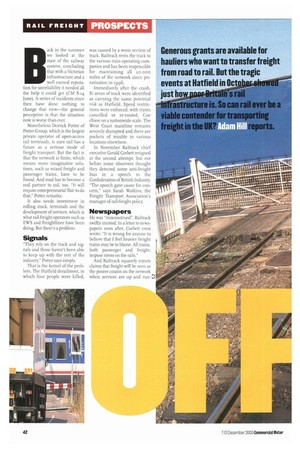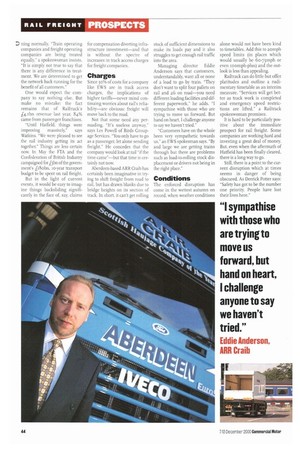ack in the summer we looked at the state of
Page 44

Page 46

If you've noticed an error in this article please click here to report it so we can fix it.
the railway system, concluding that with a Victorian infrastructure and a well earned reputa tion for unreliability it needed all
the help it could get (CM 8-14
June). A series of incidents since then have done nothing to change that view—the general perception is that the situation now is worse than ever.
Nonetheless Derrick Potter of Potter Group, which is the largest private operator of open-access rail terminals, is sure rail has a future as a serious mode of freight transport. But the fact is that the network is finite, which means more imaginative solutions, such as mixed freight and passenger trains, have to be found. And road has to become a real partner to rail, too. "It will require entrepreneurial flair to do that," Potter remarks.
It also needs investment in rolling stock, terminals and the development of services, which is what rail-freight operators such as FWS and Freightliner have been doing. But there's a problem,
Signals
"They rely on the track and signals and those haven't been able to keep up with the rest of the industry," Potter says simply.
That is the kernel of the problem. The Hatfield derailment, in which four people were killed, was caused by a worn section ot track. Railtrack rents the track to the various train operating companies and has been responsible for maintaining all 20,000 miles of the network since privatisation in 1996.
Immediately after the crash, 81 areas of track were identified as carrying the same potential risk as Hatfield. Speed restrictions were enforced, with trains cancelled or re-routed. Cue chaos on a nationwide scale. The West Coast mainline remains severely disrupted and there are pockets of trouble in various locations elsewhere.
In November Railtrack chief executive Gerald Corbett resigned at the second attempt, but not before some observers thought they detected some anti-freight bias in a speech to the Confederation of British Industry. "The speech gave cause for concern," says Sarah Watkins the Freight Transport Association's manager of rail-freight policy.
Newspapers
He was "misconstrued", Railtrack swiftly insisted. In a letter to newspapers soon after, Corbett even wrote: "It is wrong for anyone to believe that I feel heavier freight trains may be to blame. All trains, both passenger and freight, impose stress on the rails."
And Railtrack squarely rejects claims that freight will be seen as the poorer cousin on the network when services are up and runD ning normally. "Train operating companies and freight operating companies are being treated equally," a spokeswoman insists, "It is simply not true to say that there is any difference in treatment. We are determined to get the network back running for the benefit of all customers."
One would expect the company to say nothing else. But make no mistake: the fact remains that of Railtrack's /.4.ibn revenue last year, 84% came from passenger Franchises.
"Until Hatfield, things were improving massively," says Watkins. "We were pleased to see the rail industry getting its act together." Things are less certain now. In May the FTA and the Confederation of British Industry campaigned for ijbn of the government's li8obn, 10-year transport budget to be spent on rail freight.
But in the light of current events, it would be easy to imagine things backsliding significantly in the face of, say, claims for compensation diverting infrastructure investment—and that is without the spectre of increases in track access charges for freight companies.
Charges
Since 3o% of costs for a company like EWS are in track access charges, the implications of higher tan i Ifs—never mind continuing worries about rail's reliability—are obvious: freight will move back to the road.
Not that some need any persuading. 'It's useless anyway." says Les Powell of Birds Groupage Services. "You only have to go as a passenger, let alone sending freight." He concedes that the company would look at rail "if the time came—but that time is certainly not now.
Aberdeen-based ARR Craib has certainly been imaginative in trying to shift freight from road to rail, but has drawn blanks due to bridge heights on its section of track. In short. it can't get rolling stock of sufficient dimensions to make its loads pay and it also struggles to get enough rail traffic into the area.
Managing director Eddie Anderson says that customers, understandably, want all or none of a load to go by train. "They don't want to split four pallets on rail and 26 on road—you need different loading facilities and different paperwork," he adds. "I sympathise with those who are trying to move us forward. But hand on heart. I challenge anyone to say we haven't tried."
"Customers have on the whole been very sympathetic towards us," an EWS spokesman says. "By and large we are getting trains through but there are problems such as load-to-rolling stock displacement or drivers not being in the right place."
Conditions
The enforced disruption has come in the wettest autumn on record, when weather conditions alone would not have been kind to timetables. Add this to 20rnph speed limits (in places which would usually be 60-75mph or even roomph-plus) and the outlook is less than appealing.
Railtrack can do little but offer platitudes and outline a rudimentary timetable as an interim measure. "Services will get better as track work is completed and emergency speed restrictions are lifted," a Railtrack spokeswoman promises.
It is hard to be particularly positive about the immediate prospect for rail freight. Some companies are working hard and investing a great deal of money. But, even when the aftermath of Hatfield has been finally cleared, there is a long way to go.
Still, there is a point to the current disruption which at times seems in danger of being obscured. As Derrick Potter says: "Safety has got to be the number one priority. People have lost their lives here."








































































































